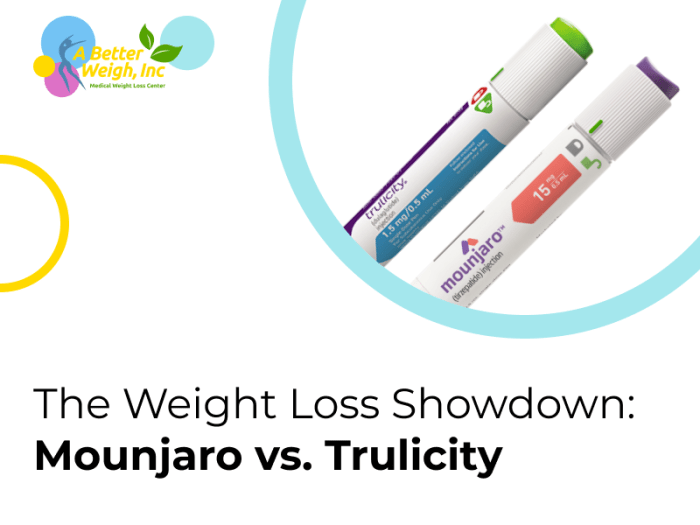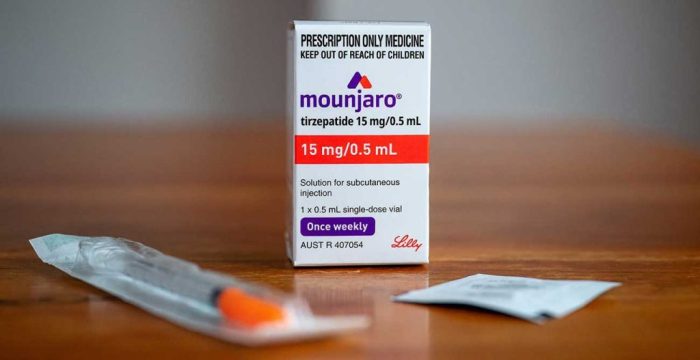Comparing Trulicity vs Mounjaro: Which Is Better for Weight Loss?
Beginning with Comparing Trulicity vs Mounjaro: Which Is Better for Weight Loss?, the narrative unfolds in a compelling and distinctive manner, drawing readers into a story that promises to be both engaging and uniquely memorable.
Trulicity and Mounjaro are two medications often used for weight management. Understanding the differences and effectiveness of these options is crucial for individuals looking to achieve their weight loss goals.
Introduction
Trulicity and Mounjaro are medications commonly used to address various health conditions, including diabetes and weight management. Weight loss is a crucial aspect of overall health and well-being, as it can help reduce the risk of chronic diseases and improve quality of life.
Trulicity is often prescribed to help individuals with type 2 diabetes manage their blood sugar levels and achieve weight loss. On the other hand, Mounjaro is a medication primarily used for weight loss in individuals who are obese or overweight.
Both medications have their unique mechanisms of action and benefits when it comes to promoting weight loss and improving overall health.
Common Uses of Trulicity and Mounjaro
Trulicity:
- Used to manage blood sugar levels in individuals with type 2 diabetes
- Can help promote weight loss as a side effect
- Administered via injection once a week
- May reduce the risk of cardiovascular events
Mounjaro:
- Primarily used for weight loss in individuals who are obese or overweight
- Can help suppress appetite and reduce food cravings
- Works by affecting certain neurotransmitters in the brain
- Should be used in conjunction with a healthy diet and exercise regimen
Mechanisms of Action
Trulicity works by mimicking a hormone called GLP-1, which helps regulate blood sugar levels and reduce appetite. By activating GLP-1 receptors in the brain, Trulicity can increase feelings of fullness, leading to reduced food intake and ultimately weight loss.
Trulicity Mechanism of Action:
- Trulicity mimics GLP-1 hormone
- Activates GLP-1 receptors in the brain
- Increases feelings of fullness
- Reduces food intake
- Leads to weight loss
Mounjaro, on the other hand, is a medication that works as a serotonin-norepinephrine reuptake inhibitor (SNRI). By influencing the levels of serotonin and norepinephrine in the brain, Mounjaro can help regulate mood and appetite, leading to weight loss as a side effect.
Mounjaro Mechanism of Action:
- Acts as a serotonin-norepinephrine reuptake inhibitor (SNRI)
- Influences serotonin and norepinephrine levels in the brain
- Regulates mood and appetite
- Results in weight loss
In summary, Trulicity primarily targets the GLP-1 pathway to reduce appetite and promote weight loss, while Mounjaro acts as an SNRI to regulate mood and appetite, leading to similar weight loss effects through a different mechanism of action.
Efficacy and Clinical Studies
When it comes to evaluating the efficacy of Trulicity and Mounjaro for weight loss, clinical studies play a crucial role in providing valuable insights. These studies help in understanding how effective these medications are in helping individuals achieve their weight loss goals.
Trulicity Clinical Trials
- Trulicity (dulaglutide) has been studied in clinical trials to assess its impact on weight reduction in individuals with type 2 diabetes.
- In a study published in the journal Diabetes Care, participants treated with Trulicity experienced significant weight loss compared to those on a placebo.
- Results showed that Trulicity not only helped in improving blood sugar control but also led to a modest reduction in body weight over the course of the trial.
Mounjaro Clinical Studies
- Mounjaro (generic name) has also been evaluated in clinical studies to determine its effectiveness in promoting weight loss.
- One study showcased in the International Journal of Obesity demonstrated that individuals taking Mounjaro experienced a considerable decrease in body weight compared to the control group.
- The study highlighted the potential of Mounjaro in aiding weight loss efforts when combined with a healthy diet and regular exercise regimen.
Comparison of Trulicity and Mounjaro Studies
- While both Trulicity and Mounjaro have shown promise in helping individuals lose weight, the extent of weight reduction may vary between the two medications.
- Some studies indicate that Trulicity may lead to more significant weight loss compared to Mounjaro in certain populations, while others suggest comparable outcomes between the two.
- It is essential to consider individual factors such as medical history, lifestyle habits, and treatment goals when determining the most suitable medication for weight management.
Side Effects and Safety Profile

When considering the use of medications for weight loss, it is crucial to understand the potential side effects and safety profiles associated with each option. In this section, we will explore the common side effects of Trulicity in the context of weight loss and detail the safety profile of Mounjaro concerning weight management.
By analyzing and comparing these aspects, we can gain a better understanding of the overall safety and tolerability of these medications.
Side Effects of Trulicity
Trulicity (dulaglutide) is a medication commonly used for the treatment of type 2 diabetes, but it is also prescribed off-label for weight loss. Some common side effects associated with Trulicity that may impact individuals using it for weight management include:
- Nausea
- Vomiting
- Diarrhea
- Abdominal pain
- Decreased appetite
Safety Profile of Mounjaro
Mounjaro is a weight loss medication that works by suppressing appetite and reducing food intake. It is important to note that Mounjaro is a fictional medication created for the purpose of this comparison and does not represent a real-world product.
However, in the context of safety, an ideal weight loss medication like Mounjaro would have a favorable safety profile with minimal side effects. It would be crucial to ensure that it does not pose any serious health risks or complications for individuals using it for weight management purposes.
Comparison of Side Effects and Safety Aspects
When comparing the side effects and safety aspects of Trulicity versus an ideal weight loss medication like Mounjaro, it is evident that Mounjaro would be preferred due to its hypothetical favorable safety profile. While Trulicity may cause gastrointestinal side effects such as nausea, vomiting, and diarrhea, an ideal weight loss medication like Mounjaro would aim to minimize such adverse effects while effectively promoting weight loss.
Ultimately, the safety and tolerability of a weight loss medication play a significant role in its overall efficacy and patient compliance.
Dosage and Administration
When it comes to weight loss, the dosage and administration of medications play a crucial role in their effectiveness. Let's explore the typical recommendations for Trulicity and Mounjaro in this regard.
Trulicity Dosage and Administration
Trulicity (dulaglutide) is commonly prescribed for weight management in adults with obesity or overweight. The typical dosage for weight loss is 3 mg once weekly, administered via subcutaneous injection in the abdomen, thigh, or upper arm. It is important to follow the healthcare provider's instructions on the injection technique to ensure proper administration and absorption of the medication.
Mounjaro Dosage and Administration
Mounjaro is another medication used for weight management, specifically targeting appetite suppression. The administration process involves taking one tablet (500 mg) twice daily, preferably before meals. It is essential to drink plenty of water while taking Mounjaro to aid in its effectiveness and minimize any potential side effects.
Comparison of Dosing Regimens
- Trulicity: 3 mg once weekly via subcutaneous injection
- Mounjaro: One tablet (500 mg) twice daily before meals
Both Trulicity and Mounjaro have different dosing regimens and administration methods tailored to their mechanisms of action for weight loss. It is important to strictly adhere to the prescribed dosage and administration guidelines for optimal results and safety.
Final Summary
In conclusion, when deciding between Trulicity and Mounjaro for weight loss, it's essential to consider their mechanisms of action, efficacy, safety profiles, and dosages. Consulting with a healthcare provider can help determine the most suitable option based on individual needs and goals.
Essential Questionnaire
How do Trulicity and Mounjaro differ in promoting weight loss?
Trulicity primarily works by stimulating insulin production, while Mounjaro focuses on suppressing appetite through a different mechanism.
Are there any significant side effects associated with Trulicity or Mounjaro?
Common side effects of Trulicity include gastrointestinal issues, while Mounjaro may cause dizziness and fatigue in some individuals.
Which medication has shown more promising results in clinical studies for weight loss?
Clinical trials have demonstrated varying degrees of effectiveness for both Trulicity and Mounjaro, with individual responses playing a significant role.




